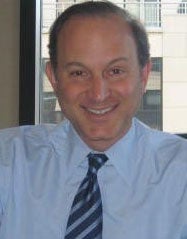Post Date: May 26, 2006
On May 17th, more than 160 Harvard-trained financiers and lawyers met for a breakfast symposium at the University Club in Manhattan to hear a panel of experts discuss the growing involvement of hedge funds in the financing and management of start-ups and other companies.
Hosted by Barry Volpert ’86, chairman of Crestview Partners, the event was titled “The Emerging Financial Landscape: Managing Convergence.”
An all-star panel of five investment bankers and hedge fund managers—plus Harvard Law School Professor Howell Jackson ’82—sifted through implications of the trend, which has seen hedge funds starting to look and act increasingly like venture capitalists.
Hedge funds are limited partnerships of investors typically known for trading in public securities, currencies and other liquid investments. Traditionally, they have been interested primarily in short-term investments, selling some stocks short while buying others (hence “hedging” some of their market risk), and have been loosely regulated.
By comparison, venture capital firms have been focused on providing seed money for small to mid-sized newer companies and then nurturing them patiently, with a long-term eye towards profitability, hoping to reap their returns later through sales of those companies or in public stock offerings that receive considerable regulatory scrutiny by the SEC and other agencies.
But recently, growing numbers of hedge funds have become stakeholders in start-ups, troubled companies (“turnaround opportunities”) and deals in which they are, for all practical purposes, providers of venture capital. “Hedge funds are becoming an increasingly important source of capital in our deals,” said panelist James A. Attwood, Jr. ’84, a venture capitalist who is managing director of the Carlyle Group.
In fact, hedge funds, sitting on record amounts of money, have been looking to do more than just trade stock, and have helped finance some of the biggest venture capital deals in this year’s first quarter, according to the Wall Street Journal.
Along with those investments, they are taking a more active role in the management and strategic planning of the companies they help finance. The term for the trend is “convergence.” The panelists at the breakfast symposium discussed its extent and its implications, including whether hedge funds will now receive more regulatory attention from the SEC, the fee structures of hedge fund managers, and whether they are “piggybacking” off the hard work and expertise of the venture capitalists whom they join in deals.
“I don’t think the hedge funds are piggybacking off us,” said Glenn Hutchins ’83, a venture capitalist and the co-founder and managing director of Silver Lake Partners. “They bring a very different skill set, checking in with the markets and their investors every day. They’re very good at watching and reacting to day-to-day changes.”
Arthur Lev ’86, a partner and general counsel of FrontPoint Partners LLC, agreed: “Our investors want to see results on a daily, real-time basis. They’re looking for that incremental edge.”
Despite their growing involvement with venture capitalists, however, hedge fund managers are still not as interested in the long-term growth of the companies in which they invest, suggested Attwood, a venture capitalist. “Our philosophy is, how can we help this company get to the next level?”
In addition to Volpert, Attwood, Hutchins and Lev, the panel included Lawrence B. Sorrell ’85, managing partner of Tailwind Capital. Panelists were introduced by Finn M.W. Caspersen ’66, chairman and CEO of Knickerbocker LLC and chairman of the Harvard Law School Dean’s Advisory Board. Among those in attendance was former Massachusetts Governor William F. Weld ’70, now of Leeds Weld & Co.
